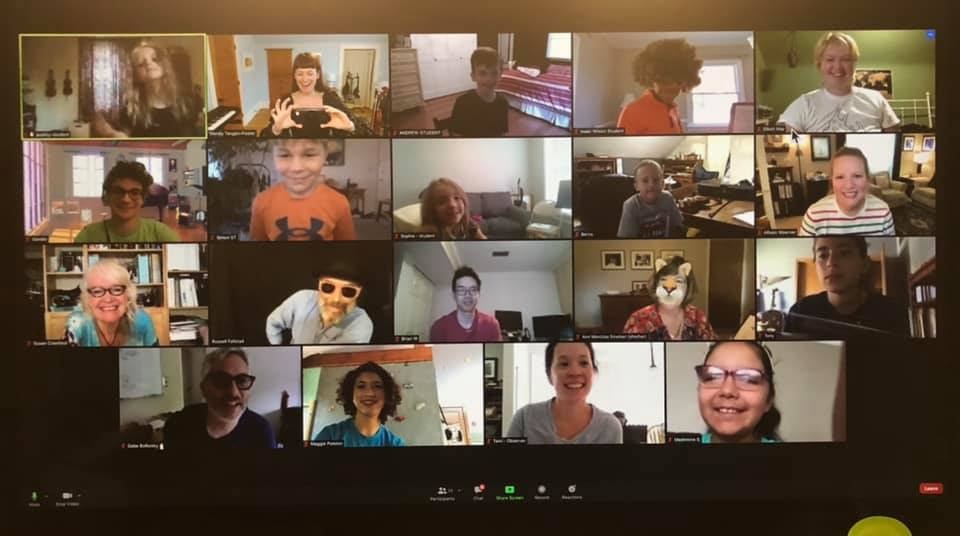There’s more (and less) to practicing than you might think
How your job as a music parent changes as your kid gets older
Guest posted by Gabe Kitayama-Bolkosky from Education for Happiness

Practice is one of the most talked about, misunderstood, and crucial aspects of learning a musical instrument. A good practice involves having goals, perhaps intense goals, but must be moderate enough to invite a willingness to try again each day. For people who might be new to practicing a musical instrument, yogic principles (i.e. not striving, softness, smooth breath, noticing thoughts) can be a helpful model. This is the only sustainable way to get good at something, without sacrificing one’s mental health.
Being a yogi also centers around community. Through our online Rollin’ Daily Practice Club, we hope to build a supportive community of musicians. Sometimes practicing musicians (and their parents) just need a little company and someone to check in with even just for a moment to make sure that the practice stays light and productive.
Practicing looks different through different developmental stages. Practice can evolve delightfully as the body and mind develop. For a parent that wants to connect deeply with their child over the long term, a delightful practice can build a trust that will endure and spread to other things. Here are four stages of practicing that you and/or your child can try out with our community.
Ages 3-6 Do or do not. A child at this age needs to feel a sense of control over their environment. Practice is an unknown and unknowable approach to them, so it is wise for parents and other adults to unfold it in an environment that takes into account what is relevant to them; namely, “I do this when I want to, not because you want me to.” A masterful environment pulls for this daily decision to play the instrument, so if we are rooting for the child to do it, we must make it as delightful as possible. Having a community of similar aged kids, practicing the same repertoire with their parents can have a huge impact on a child’s interest and willingness to participate daily. The long term impact of this type of nurturing can have a profound effect on subsequent outcomes.
Ages 7-10 Doing and understanding. At this stage, coordination begins to refine and develop. Through detailed and loving interactions with a parent and/or trusted adults, a child can develop a sense of confidence in their abilities. Confidence also grows with social interactions and feedback from peers if the environment is nurturing. Prioritizing a nurturing environment makes sure the learner knows at every moment that they are more important than what they do. Learning and understanding begin to be more autonomous at this stage and a mindful adult will be able to support that by following careful practice protocol. Honest praise and affirmation can be a strong mirror for the child as they move into adolescence. All of this is easier to remember when we see others doing it at the same time. Because of the uniqueness of the online community, people can practice side-by-side, feeling encouraged at the sight of others practicing too. Supervised Daily Practice Club can provide a loving online community to work on these crucial practice skills.
Ages 10-14 Doing, understanding, and the rise of complex thought. Pre-adolescence is often misunderstood by many parents. At this stage the child may be mostly capable of autonomous work, but craves the company of another person, especially when they feel insecure. They develop enough self awareness to wonder more about who they are and how they relate to the whole. Sometimes, the isolation of daily practice for someone in pre-adolescence can feel unbearable. Oftentimes, parents feel confused that a child simply wants their attention and company, but not their help. This is crucial because it sets the mental stage for adult life when the child practices and learns without the parent there. An admiring parent fortifies subsequent experiences.
Ages 15-25 Integration. Practicing alone is a very important skill for the adolescent and young adult, but should not be a replacement for what has been learned in the earlier stages. There is still a need for company, a need for admiration, and of course a need for help. If this has been smoothly maintained in daily practice, the adolescent will understand that to be a good musician is to integrate all of the stages of learning. When adulthood arrives, they feel a sense of confidence and joy when working with others because of the deep daily nurtured practice all along their childhood path. Being with others while learning brings a feeling of joy and connection, rather than insecurity and doubt.





